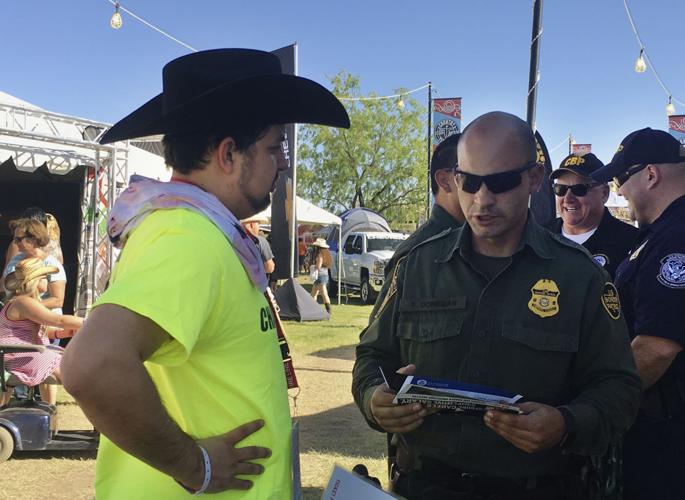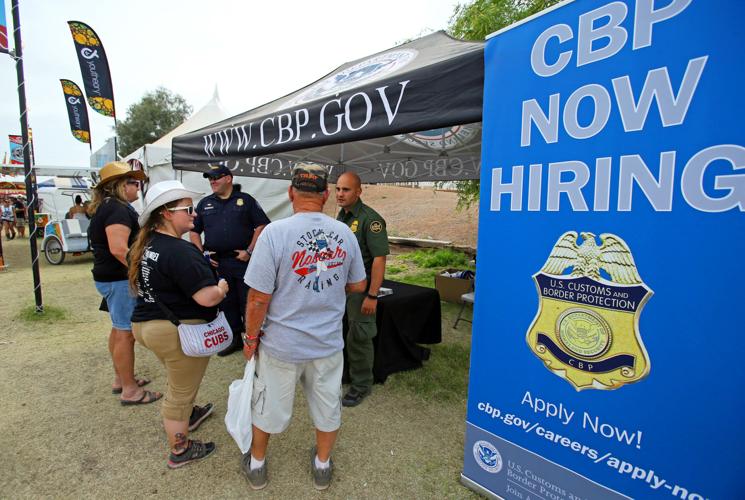FLORENCE, Ariz. — The beer was flowing and music was blaring in the middle of the Arizona desert when Ric Kindle approached a group of Border Patrol agents and customs officers out to recruit new hires.
This was no average job fair. This was Country Thunder, one of the nation's largest country music festivals, where U.S. Customs and Border Protection set up a booth in front of a pop-up casino and near the merchandise tent as part of an effort to recruit thousands of new agents and officers.
Customs and Border Protection, the parent agency of the Border Patrol and the office that oversees customs officers, has been hiring for several years and now may need to fill an additional 5,000 positions within the Border Patrol that President Donald Trump ordered under his plan to bolster border security. Both the Border Patrol and customs officers were at the festival.
Kindle, 24, said he'd be applying to the Border Patrol as soon as he got home at the end of the four-day festival. He said he's wanted to get into law enforcement ever since a local police officer took him on a ride-along when he was a teenager who skipped school and lacked motivation.
"I don't care what form of force it is, I just kind of want to make a difference," said Kindle, a Phoenix-area resident who works as a fast-food cook. He was volunteering for a nonprofit that raises money for families of first responders who are hurt or killed on the job.
The presence of border agents and customs officers at the country festival is part of an aggressive recruitment effort to seek out prospective employees. Customs and Border Protection has been showing up at bull-riding competitions, Big 10 and Big 12 sports tournaments, job fairs and country music fests like the one last month in Florence, southeast of Phoenix.
"We do recruiting at pretty much anywhere we have an opportunity to show up. It could be something as small as a community event at a local park," said Border Patrol spokesman Vicente Paco, who handed out brochures to festivalgoers.
The recruiting comes as the agency is having a difficult time finding enough agents.
Prospective hires need to relocate to remote locations like the small town of Ajo, near the U.S.-Mexico border, and the southern Texas city of Harlingen. They also must get through a comprehensive vetting process that involves passing a lie-detector test in which applicants are asked about things like drug use and past criminal activity.
Customs and Border Protection also has had a hard time filling positions within its Office of Field Operations, which manages ports of entries and international arrivals at airports.
The Associated Press reported in January that about two-thirds of Customs and Border Protection applicants fail the required polygraph exam, more than double the average rate of applicants at eight law enforcement agencies that provided data to the AP. Customs and Border Protection officials have since pegged the failure rate at about 75 percent.
The agency has struggled to find enough customs officers since announcing an expansion effort in 2014. It said it was allocating 170 new jobs in Arizona, most of which would be assigned in Nogales, the state's busiest area for border crossings. As of April 1, the agency has filled 72 percent of those positions in the state.
The Border Patrol, meanwhile, has slightly fewer than 20,000 agents nationwide, a vastly larger number than it had in the 1990s but still smaller than a couple of years ago. The agency has lost agents to attrition and has a hiring rate of less than 1 percent.
Trump's plan calls for bringing on 5,000 new Border Patrol positions. Congress still hasn't finalized funding for next year, and it's unclear whether the agency will get more money for hiring. Agent salaries start at about $40,000 annually.
In April, then-Border Patrol Chief Ron Vitiello told The Associated Press the agency is working to improve the hiring process. It needs congressional approval to waive the polygraph in some instances.
The agency also will face competition from within the Homeland Security Department as Immigration and Customs Enforcement looks to hire about 10,000 agents. ICE says it's not undertaking any large-scale recruitment efforts at the moment.
"We just have to be a little bit faster than them," said Vitiello, who was promoted to a new job in the agency.
Not everyone agrees that the agency should expand and do so rapidly.
The nonpartisan American Immigration Council released a report in April questioning the expansion and noting that problems abounded when the Border Patrol grew from a little over 4,000 agents in 1994 to nearly 20,000 in 2016.
"The last time the Border Patrol received a large infusion of money to hire thousands of new agents, cases of corruption and misconduct spiked in the agency. New hires were not sufficiently vetted, novice agents were not adequately supervised, and agents who abused their authority acted with impunity," report author Josiah Heyman wrote.
To attract new agents, Border Patrol recruiters fan out to places like the annual Country Thunder event, which draws 30,000 people a day.
Agents and officers touted the perks of joining as concertgoers in boots and cowboy hats stopped by. Most of the people who spoke with the agents were middle-aged and thanked them for the work they do, shaking their hands and some asking to take a photo with them.
Others inquired about the job.
Colten Demers, 22, said he's wanted to get into law enforcement for as long as he can remember. The son of a former police officer, Demers works two jobs as a security officer in Scottsdale, although he's applied to work at several police forces.
Demers would rather work in the city but said he wouldn't rule out joining the Border Patrol and that he likely will apply.
"We do need guys on the border," he said.
___
Associated Press writer Alicia A. Caldwell in San Antonio, Texas, contributed to this report.





